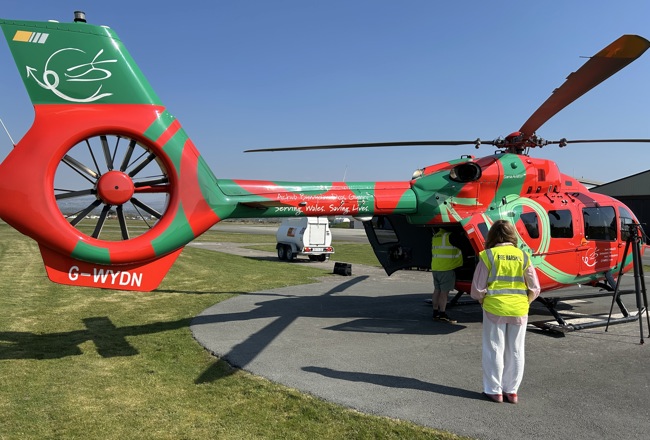- Share icon
- Share on LinkedIn
- Share on Twitter
- Share on Facebook

Describe what you do.
The Welsh Air Ambulance was established on St David's Day, 1 March 2001. Our vision is to improve the lives of patients and their families by being a world leader in time-critical care. We are the only air ambulance charity, based in, and dedicated to, the people of Wales. Our service operates 24 hours a day, 7 days a week, and is funded entirely by charitable donations. Every year, we need to raise £11.2 million to keep our helicopters in the air and our fleet of rapid response vehicles on the road. We are there for the people of Wales, whenever and wherever we are needed.
Why is it important to you as a charity to engage with communities across Wales in their chosen language?
Although we are not legally required to implement provisions in Welsh, we believe it is the right thing to do for our staff, volunteers, supporters, and the communities we engage with.
As a charity with its roots in Wales, we recognise that language is a key part of cultural identity. The Welsh language is an integral part of many communities, and engaging with people in their mother tongue allows us to serve them better.
You are currently working towards receiving the Cynnig Cymraeg - what inspired you to take this step?
In 2023, we launched our Welsh Language project, a project identified in our five-year strategy to improve our Welsh language provision.
While working on this project, I contacted the Welsh Language Commissioner's office. I had seen the Cynnig Cymraeg logo before but I was not fully aware of its significance. After learning more and talking to the Commissioner's office, we realised that official approval from the Commissioner would be a powerful way to show our commitment. Rather than simply declaring our dedication to the culture and heritage of Wales, this certification is evidence of our efforts.
How has the process been so far?
One of the most inspiring aspects has been the enthusiasm from everyone, not just the fluent Welsh speakers. Many of our staff were born in Wales but are not confident Welsh speakers, yet they are equally passionate about supporting the language.
From talking to my peers at third sector networking events, I know that many organisations face the same constraints. The Welsh Language Commissioner’s staff have been there for us every step of the process, with templates for our plan and our work, feedback and advice.
How does the Welsh language fit into your work - be it in emergency situations or in your work engaging with the community?
As a charity based in Wales and focusing on the community, it is important to us that people have the choice to communicate in Welsh. We have regional teams dedicated to understanding and addressing the specific needs of each area, tailoring our approach accordingly.
Also, many of the people who raise money are former patients or have a personal connection to our service. Sharing their stories can be emotional, and having our services available bilingually is something we strive to achieve.
The Welsh language is also an integral part of our wider strategy, especially in terms of social sustainability. Through bilingual materials, Welsh social media messages, or ensuring that Welsh-speaking staff are available, when possible, we are committed to supporting and promoting the Welsh language across all areas of our work.
What steps have you taken so far to increase the use of the Welsh language in your organisation?
As part of our commitment to strengthening our Welsh language provision, we have introduced several key initiatives such as, a new Welsh Language policy, working towards the Cynnig Cymraeg, a database of staff who speak Welsh and their levels of competence, more opportunities to learn Welsh for staff, and a new bilingual website.
As well as these big changes, we've also focused on the smaller, everyday steps that make a difference.
What will receiving the Cynnig Cymraeg mean for you and the people you support?
Gaining official recognition for our commitment to the Welsh language will be an incredible milestone, something we can display as a badge of honour that reflects the dedication and hard work of everyone involved.
Receiving the Cynnig Cymraeg is evidence that our efforts to improve Welsh language provision have had a real impact. More importantly, it reassures the people of Wales that we are committed to engaging with them in their first language. This recognition will strengthen our relationship with supporters, the public and our partners, reinforcing our role as a truly Welsh organisation.
What advice would you give to other charities or organisations considering starting their own journey?
Communication is key. Charities often face resource constraints, time and money. That is the reason why communication with your colleagues is crucial.
By including different departments, talking to people at all levels, and explaining the benefits of Welsh language provision, we have created a sense of purpose. For some departments, the financial benefits were key. Some grant funders require a Welsh language policy, so this was used as an opportunity to show how investing in the language can open doors to additional funding.
For others, the focus was on reputation and faith in the charity. Research by the Charity Commission found that 81% of Welsh speakers say they have more trust in charities that communicate in Welsh. That kind of insight can be invaluable when building internal support for a Welsh language initiative.
By keeping the development of the Welsh language on the agenda and making it as easy as possible for people to be part of the campaign, you can make real progress. It is an ongoing commitment to embed the Welsh language in everyday operations and ensure that it always receives the consideration it deserves.
